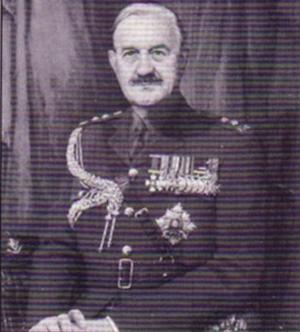
General Sir Peter Mervyn Hunt, was Chief of the General Staff, the professional head of the British Army, from 1973 to 1976. He served in the Second World War and commanded British Forces deployed in response to the Indonesia–Malaysia confrontation. Later in his career he provided advice to the British Government at a time of continuing tension associated with the Troubles in Northern Ireland.
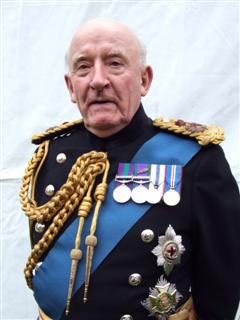
Field Marshal Peter Anthony Inge, Baron Inge, was a senior British Army officer. He was the Chief of the General Staff, the professional head of the British Army, from 1992 to 1994 and then served as Chief of the Defence Staff before retiring in 1997. Early in his military career he saw action during the Malayan Emergency and Operation Banner in Northern Ireland, and later in his career he provided advice to the British Government during the Bosnian War.

Lieutenant General Sir Edric Montague Bastyan, was a senior British Army officer, who became Governor of South Australia from 4 April 1961 until 1 June 1968 then Governor of Tasmania from 2 December 1968 until 30 November 1973. He was the last British person to be governor of either state.
General Sir Peter Edgar de la Cour de la Billière, is a former British Army officer who was Director SAS during the Iranian Embassy siege, and Commander-in-Chief of the British forces in Operation Granby.

General Sir Hugh Michael Rose,, often known as Sir Mike Rose, is a retired British Army general. As well as Special Air Service Regiment commanding officer, he was Commander United Nations Protection Force in Bosnia in 1994 during the Yugoslav Wars.
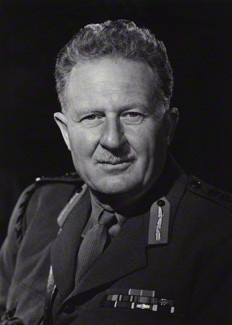
Field Marshal Sir Francis Wogan Festing, was a senior British Army officer. His most important posts were as Commander of British Forces in Hong Kong, General Officer Commanding (GOC) British Troops in Egypt (1952), GOC Eastern Command (1954), Commander-in-Chief Far East Land Forces (1956), and Chief of the Imperial General Staff (1958–61). He saw active service in the Second World War, taking a prominent role in Operation Ironclad and the Arakan offensive of the Burma campaign, and later advised the British government on ending conscription and reducing the size of the army by fifteen battalions.

Lieutenant General Jonathon Peter Riley, is a retired British Army officer and military historian.

General Sir William Platt was a senior officer of the British Army during both the First and the Second World Wars.

General Sir William Godfrey Fothergill Jackson, was a British Army officer, military historian, author and Governor of Gibraltar.
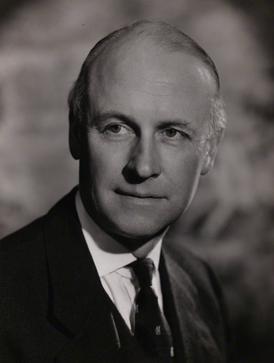
Lieutenant General Sir Ian Henry Freeland was a senior British Army officer, who served with distinction during World War II and most notably served as General Officer Commanding (GOC) and Director of Operations in security matters in Northern Ireland in the aftermath of rioting in 1969, and the beginning of the Troubles.
General Sir Frank Douglas King, was a British Army officer who served as General Officer Commanding of the British Army in Northern Ireland at the height of the Troubles. He held a number of other senior posts in the British Army, having begun his military career in the ranks during the Second World War.
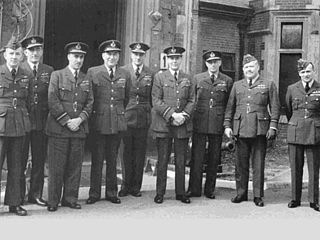
Air Marshal Sir Brian Edmund Baker was an officer of the Royal Air Force who served in both World Wars. He was a flying ace in World War I credited, in conjunction with his gunners, with twelve victories, comprising one enemy aircraft captured, four destroyed, and seven "out of control".
Major General David John Rutherford-Jones, is a retired British Army officer and former Commandant of the Royal Military Academy Sandhurst.
Lieutenant General Sir Philip Charles Cornwallis Trousdell is a retired senior British Army officer who was General Officer Commanding Northern Ireland and Commandant of the Royal Military Academy Sandhurst. He was commanding officer of the 2nd Battalion, Royal Irish Rangers before advancing to high command and in that capacity was deployed to Bosnia-Herzegovina.

General Sir Kenneth Thomas Darling was a senior British Army officer who after serving with distinction during the Second World War was Commander-in-Chief (C-in-C) of Allied Forces Northern Europe 1967–69.
Major-General Thomas Patrick David Scott, was a senior British Army officer.

General Sir Reginald Seaburne May, was a British Army officer who served as Quartermaster-General to the Forces.
Lieutenant General Peter Thomas Clayton Pearson, is a former British Army officer who served as Commandant of the Royal Military Academy Sandhurst from 2006 to 2007.
Major General Anthony John Shaw was a senior British Army officer, who was Director General of the Army Medical Services from 1988 to 1990.

Lieutenant General Sir Nicholas Robert Macrae Borton,, is a retired British Army officer, who served as commander of NATO's Allied Rapid Reaction Corps from 2021 to 2024.











